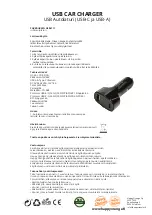
Things
to re
memb
er when
driving
74
Things to remember when driving
Break-in procedures
Moving parts need to be given some time until
they can interact smoothly with one another. To
ensure that your vehicle provides maximum
economy throughout a long service life, we
request that you observe the following.
Always obey all official speed limits.
Engine and differential
Up to 1,200 miles/2,000 km
Drive at varying engine and road speeds, but do
not exceed 4,500 rpm or 100 mph/160 km/h.
Refrain from using full throttle and avoid press-
ing the accelerator beyond the kickdown point.
After driving 1,200 miles/2,000 km
Engine and vehicle speeds can be gradually
increased.
Tires
Due to technical factors associated with their
manufacture, tires do not achieve their full trac-
tion potential until an initial break-in period has
elapsed. Therefore, drive cautiously during the
first 200 miles/300 km.
Brake system
Brakes require an initial break-in period of
approx. 300 miles/500 km to achieve optimized
contact and wear patterns between brake pads
and rotors. Drive cautiously during this break-in
period.
Clutch
The function of the clutch reaches its optimal
level only after a distance driven of approx.
300 miles/500 km. Shift gears carefully during
the break-in period.
After replacing components
The same break-in procedures should be
observed if any of the components mentioned
above have to be renewed in the course of the
vehicle's operating life.
Saving fuel
The fuel consumption of your vehicle depends
on several factors. You can lower fuel consump-
tion and the environmental impact by taking
certain measures, adjusting your driving style
and having the vehicle serviced regularly.
Remove any unneeded cargo
Additional weight increases fuel consumption.
Remove any mounted parts after you
have finished using them
Remove additional mirrors and the luggage rack
when they are no longer in use. Mounted parts
affect the vehicle's aerodynamics and increase
fuel consumption.
Close both windows
Open windows cause higher air resistance and
thus increase fuel consumption.
Check tire inflation pressure regularly
Check the tire inflation pressure at least twice a
month and before embarking on a long journey,
and correct it if necessary.
Low tire inflation pressure causes higher rolling
resistance and thus increases fuel consumption
and tire wear.
Set off immediately
Do not let the engine warm up while the car is
still standing, but set off immediately at moder-
ate engine speed. This is the fastest way for the
cold engine to reach its operating temperature.
Summary of Contents for 2008 Z4
Page 1: ...The Ultimate Driving Machine Owner s Manual for Vehicle...
Page 2: ......
Page 10: ......
Page 16: ...Cockpit 14 Around the center console controls and displays...
Page 18: ......
Page 74: ......
Page 81: ...Reference At a glance Controls Driving tips Mobility 79...
Page 82: ......
Page 110: ......
Page 117: ...Reference At a glance Controls Driving tips Mobility 115...
Page 130: ......
Page 132: ...01 41 0 014 500 ue BL0014500004 The Ultimate Driving Machine More about BMW bmwusa com...
















































